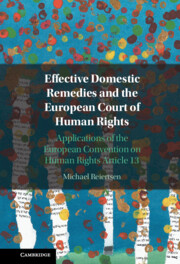 Effective Domestic Remedies and the European Court of Human Rights
Effective Domestic Remedies and the European Court of Human Rights Published online by Cambridge University Press: 11 August 2022
Chapter 5 analyzes the relationship between the international admissibility criterion on the exhaustion of domestic remedies and the right to an effective remedy in Article 13. Event though there is close affinity between the rules, the Court has never, in the abstract, explained whether the requirements of effectivenes, arising under both rules, are the same. However, as the chapter explains, several factors speak for a different threshold and evaluation of the required effectiveness.
To save this book to your Kindle, first ensure no-reply@cambridge.org is added to your Approved Personal Document E-mail List under your Personal Document Settings on the Manage Your Content and Devices page of your Amazon account. Then enter the ‘name’ part of your Kindle email address below. Find out more about saving to your Kindle.
Note you can select to save to either the @free.kindle.com or @kindle.com variations. ‘@free.kindle.com’ emails are free but can only be saved to your device when it is connected to wi-fi. ‘@kindle.com’ emails can be delivered even when you are not connected to wi-fi, but note that service fees apply.
Find out more about the Kindle Personal Document Service.
To save content items to your account, please confirm that you agree to abide by our usage policies. If this is the first time you use this feature, you will be asked to authorise Cambridge Core to connect with your account. Find out more about saving content to Dropbox.
To save content items to your account, please confirm that you agree to abide by our usage policies. If this is the first time you use this feature, you will be asked to authorise Cambridge Core to connect with your account. Find out more about saving content to Google Drive.